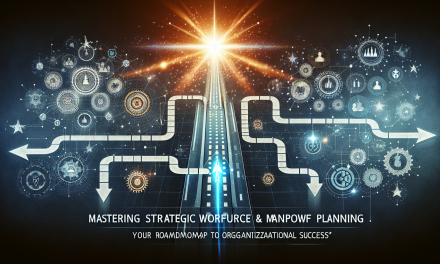Table of Contents
- Introduction to Workplace Excellence
- Understanding Career Success
- Strategies for Achieving Workplace Excellence
- Conclusion
- FAQs
Introduction to Workplace Excellence
Are you looking to elevate your career and achieve unparalleled success in your workplace? In today’s dynamic and competitive environment, standing out in your profession requires more than just completing daily tasks. You need a combination of skills, strategies, and a proactive attitude. This blog post will explore various breakthrough strategies that can significantly enhance your workplace excellence and pave the way for career success.
Understanding Career Success
Career success means different things to different people. It could entail reaching a particular job title, earning a specific income, or having a satisfying work-life balance. In essence, career success encompasses personal fulfillment coupled with professional achievements. To get there, you need to continuously seek improvement and embrace new opportunities.
Strategies for Achieving Workplace Excellence
Implementing the right strategies can propel you toward exceptional performance and advancement in your career. Below, I outline several effective strategies that can help you achieve workplace excellence.
Developing People Skills
In any job, interacting with colleagues, clients, or stakeholders is essential. Building strong relationships starts with honing your communication skills. Effective communication fosters a positive work environment and enhances collaboration. Enhancing your people skills can dramatically influence your career trajectory.
Listen Actively
Active listening demonstrates respect and a willingness to understand others’ perspectives. To become a good listener, focus on what the speaker is saying without interrupting. Ask clarifying questions to express genuine interest and engagement.
Provide Constructive Feedback
When offering feedback, aim for a constructive approach. Instead of merely pointing out flaws, focus on how to improve the situation. This method encourages team members to grow and fosters a culture of continuous improvement.
Mastering Time Management and Stress Relief
Time management is a crucial component of workplace excellence. Additionally, knowing how to manage stress effectively can significantly impact your productivity. Consider exploring strategies for time management and stress relief that fit your lifestyle and workload.
Set Clear Goals
Setting specific, measurable goals can help you prioritize tasks and work more efficiently. Break down larger objectives into smaller, manageable tasks to avoid feeling overwhelmed. This approach enables you to focus on what needs immediate attention.
Utilize Technology
There are numerous tools available today designed to help you manage your time better. Implement project management software, calendar apps, or to-do lists to keep track of your responsibilities and deadlines.
Unlocking Negotiation and Persuasion Skills
Negotiation and persuasion are vital skills that can set you apart in any workplace. Whether you are discussing a project timeline, salaries, or conflict resolutions, mastering these areas is essential. To learn more, check out this resource on unlocking negotiation and persuasion skills.
Be Prepared
Preparation is key when negotiating. Know your needs and goals, and gather relevant information that supports your position. Being well-informed enhances your confidence and increases the chances of reaching a favorable outcome.
Practice Empathy
Understanding the other party’s perspective helps you negotiate more effectively. Show empathy by acknowledging their needs and concerns, which can lead to a more collaborative approach and sustained relationships.
Harnessing Mindset, Attitude, and Motivation
Your mindset plays a significant role in determining your success. Cultivating a positive attitude and maintaining motivation are crucial. Discover ways to harness your mindset and motivation for a thriving career.
Adopt a Growth Mindset
Those with a growth mindset believe that abilities can be developed through dedication and hard work. Embrace challenges, learn from criticism, and view setbacks as opportunities for growth.
Set Personal Benchmarks
Having personal benchmarks allows you to track your development over time. Set goals not only for professional success but also for personal growth. Celebrate your achievements, no matter how small, to maintain motivation.
Mastering Advanced Business Presentation Skills
The ability to present your ideas clearly and effectively can differentiate you in the workplace. Engaging presentation skills foster active participation and can lead to greater influence. Explore advanced techniques in mastering presentation skills to enhance your communication capabilities.
Design Engaging Visuals
Utilize visual aids to complement your presentation. Eye-catching slides can keep your audience engaged and help convey your message more clearly. Focus on creating a balanced blend of textual information and visuals.
Practice Delivery
Practice is essential for any presentation. Rehearse your delivery multiple times to build confidence and reduce anxiety. Feedback from trusted colleagues can provide valuable insights into areas that need improvement.
Conclusion
Achieving career success is an ongoing journey that requires dedication and strategic planning. By focusing on developing essential skills, managing your time effectively, and cultivating a growth mindset, you lay the groundwork for your professional excellence. Don’t hesitate to explore valuable resources like Workplace Excellence Strategies for Boosting Your Career Success to further enhance your career prospects.
FAQs
What is workplace excellence?
Workplace excellence refers to the ability of individuals and organizations to operate at the highest levels of performance. It encompasses achieving personal and professional goals while fostering a productive and positive work environment.
How can I improve my people skills?
Improving people skills starts with practicing active listening, providing constructive feedback, and building empathy. Regularly interacting with colleagues and engaging in team activities can also enhance these skills.
What are effective ways to manage time and stress?
Setting clear goals, utilizing technology like project management tools, and taking breaks can help manage both time and stress. Consider prioritizing tasks and practicing relaxation techniques to maintain a balanced approach.
Why are negotiation skills important?
Negotiation skills are crucial because they enable you to navigate discussions effectively, whether it’s on project terms or personal development. These skills can lead to better outcomes and stronger professional relationships.
How can I develop a positive mindset?
Adopting a growth mindset, celebrating successes, and embracing challenges can foster a positive outlook. Engaging in regular self-reflection and seeking continuous improvement are also effective strategies.





